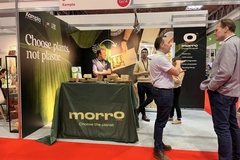
21 Sep 2020 --- Coca-Cola European Partners (CCEP) announced that all plastic bottles across its core brands in Great Britain will now be made with 50 percent recycled PET (rPET). This move covers brands including Coca-Cola, Coca-Cola Zero Sugar, Diet Coke, Fanta, Sprite, Dr Pepper and Lilt. The rest of the company’s portfolio will follow later in the year.
The shift to rPET means that Coca-Cola in Great Britain is now using over 21,000 metric tons of recycled plastic per year.
“While customers undoubtedly have their role to play, we know that we and other leading brands across the food and drinks industry have a responsibility to set an example, and to use our reach and influence to encourage other to follow our lead,” Julian Hunt, vice president of public affairs and communications at CCEP Great Britain, tells PackagingInsights.

Although Coca-Cola’s bottles have been fully recyclable for many years, a transition to bottles entirely made of rPET is not yet on the horizon, says Stephen Moorhouse, general manager at CCEP Great Britain.
“One of the key challenges the industry currently faces is that there isn’t enough food-grade recycled plastic locally available in the UK to switch to 100 percent rPET across our entire range. There needs to be more high-quality recycled plastic produced, so it’s vital to make sure we collect more bottles in an efficient way and stop it ending up as waste.”
“Recycle me again: I’m 50% recycled” labels
To notify consumers of the change and encourage more frequent recycling practices, the new CCEP bottles will carry labels that read “Recycle me again: I’m 50% recycled.”
Furthermore, CCEP plans on continuing to develop consumer communication across its social and traditional media to remind consumers that all of its bottles and cans are 100 percent recyclable.
 The new labels highlight the increased rPET content and encourage consumers to recycle.A similar move was already carried out on Coca-Cola Sweden’s 100 percent rPET bottles in February. The Swedish bottles read “Panta mig igen,” meaning “Recycle me again,” in place of brand names and logos.
The new labels highlight the increased rPET content and encourage consumers to recycle.A similar move was already carried out on Coca-Cola Sweden’s 100 percent rPET bottles in February. The Swedish bottles read “Panta mig igen,” meaning “Recycle me again,” in place of brand names and logos.
Innova Market Insights pegged “The Language of Environmental Sustainability” as its top packaging trend for 2020. FMCG brands are increasingly acknowledging the environmental attributes of packaging as a key selling proposition of consumer packaged goods.
Deposit Return Schemes key to rPET supply
Despite its efforts to encourage recycling, Moorhouse notes that “too many” Coca-Cola bottles are still not being recycled.
“DRS has enabled the production of high quality rPET resin in both Dutch and Norwegian markets, meaning that Coca-Cola was able to switch to 100 percent recycled material across its entire portfolio in those markets sooner than elsewhere in Europe,” adds Hunt.
“That’s why we’re standing alongside other major players in the industry through our industry federations and continue to have a constant dialogue with the UK governments to support the introduction of a well-designed DRS across Great Britain that works for everyone.”
According to impending EU legislation, Member States will be obliged to collect 90 percent of single-use plastic drinks bottles by 2025. DRS is widely regarded as crucial to meeting this requirement.
PackagingInsights reported how Member States will struggle to reach plastic recyclate content targets without better-established DRS.
The Scottish government laid out plans for an “ambitious” DRS last year. Expected to launch in 2021, the DRS will include aluminum and steel cans, as well as drinks containers made of glass and PET.
Moreover, the UK government has proposed a £200 (US$263) per ton tax rate for plastic packaging with less than 30 percent recycled content that will take effect from April 2022.
“We are moving to 50 percent well ahead of that date, with an ambition to go further. Our target of 50 percent was launched as part of our This is Forward strategy in 2017,” Hunt concludes.
By Anni Schleicher












